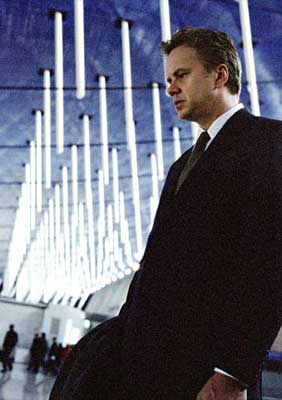
 Code 46 is a complex science fiction musing set in the near future
where the world population is separated by those living inside big
cities and those poorer peoples living outside. The population is
controlled by various codes and passwords, papers and authentications,
viruses and corrective medical procedures.
The "Code 46" of the title is a bit of a spoiler for the
story, though no more than the lengthy written prologue that begins the
film. It refers to the ban on offspring for
genetically matched parents, the result of an incestuous union, which
can be commonplace and unknown to the parents due to advancements in
human cloning and in-vitro fertilization.
Code 46 is a complex science fiction musing set in the near future
where the world population is separated by those living inside big
cities and those poorer peoples living outside. The population is
controlled by various codes and passwords, papers and authentications,
viruses and corrective medical procedures.
The "Code 46" of the title is a bit of a spoiler for the
story, though no more than the lengthy written prologue that begins the
film. It refers to the ban on offspring for
genetically matched parents, the result of an incestuous union, which
can be commonplace and unknown to the parents due to advancements in
human cloning and in-vitro fertilization.
Tim Robbins (The Truth About Charlie,
Antitrust) stars as William Geld, an investigator of insurance fraud
sent to Shanghai to investigate the employees of a company that
manufactures cover papers of insurance for purported forgeries and
smuggling. His investigation leads him to Maria Gonzalez (Morton,
In America), a young
woman he feels a connection to, which leads to him ending up protecting
her rather than turning her in. Eventually, his empathy deepens to
feelings of fondness for the young woman, until the two unite.
This presents a problem for the inspector, as he finds himself
compromised as to his job, his marriage, and his ability to keep from
breaking the codes he is trying to uphold.
Directed in somber but sumptuous fashion by Michael Winterbottom (A
Mighty Heart, 24 Hour Party People), the
future setting of Code 46 isn't terribly different from our
own, but it is more insular in its vision of people existing on a
city-wide basis, surrounded by glass and structure, relying on
electronic communications to continue to link each other globally.
Winterbottom creates a very futuristic portrayal of a potential future
using not much more than pre-existing exotic-looking locales and
architecture in which to present his story. Steadicam and POV
camerawork add to the intimate and off-center mix of visuals.
The screenplay by Frank Cotrell Boyce (Hilary
and Jackie, Millions) is intelligent, though a bit lean
on exposition. Despite the written prelude setting up the
explanation for what the world we're about to enter through the
narrative is like, much of what goes on in the story is inferred rather
than explained. While it's enjoyable to find a film that doesn't
dumb everything down with over explanation, there will be moments,
perhaps even long stretches, where things aren't really making sense.
Why do people in Shanghai speak Spanglish, for instance? Why such
a disparity between inside and outside living conditions, and what are
the distinguishing characteristics of the two? Why can't those on
the inside traverse into the daylight? Conjecture may lead to some
interesting theories, and that's part of the film's allure, but not
everyone in the audience will be comfortable grasping for answers to
basic questions left off the screen.
The film is about the future of the world, without actually being about
the world. Rather, it's a commentary on the direction our current
world is heading from a technological, biological and multicultural
standpoint, but done through a more personal and intimate story of two
people who make a connection they aren't supposed to make -- is it right
for society to reduce love down to genetic matches and viruses?
Robbins and Morton deliver strong performances, despite the fact that
the characters aren't fully shaded with details about their past and
their motivation for what they do in the present.
Code 46 feels like a close cousin to the futuristic vision as
portrayed in such iconic science fiction films as
Blade Runner
or Gattaca, though with a more realistic approach to technology
and societal evolution. What it does appear to be missing, which
may make some viewers lose interest, is a clear-cut conflict in the plot
through which the rest of the story can wrap its themes around. In
the end, its an intriguing and beguiling vision of a potential future
for our world that's as fascinating as it is confusing.
Recommended only for those who truly enjoy films that take some time and
focus to follow intellectually, even if it's emotionally disengaging.

